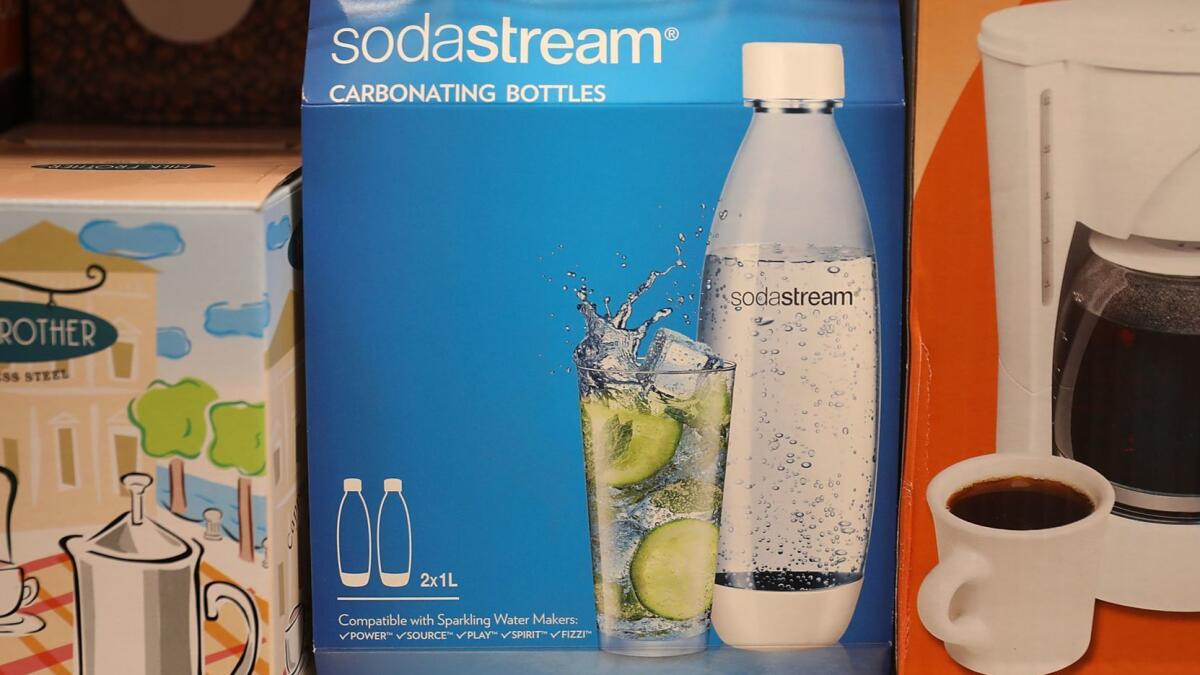PepsiCo is buying SodaStream for $3.2 billion as sugary soft drinks lose popularity

PepsiCo Inc. agreed to buy fizzy-drinks dispenser SodaStream International Ltd. for $3.2 billion, sending the company synonymous with sugary sodas into the homes of more health-conscious consumers.
PepsiCo will pay $144 a share in cash for the Israeli company, the companies said in a statement Monday. That’s 11% higher than Friday’s closing price and would be the Purchase, N.Y., company’s largest acquisition in eight years.
In one of her final acts as chief executive of PepsiCo, Indra Nooyi is betting on a razors-and-blades kind of business model to reanimate revenue growth that has been waning due to weak demand for traditional sugary soft drinks. SodaStream sells machines used with compatible carbon dioxide capsules and optional flavored syrups, and its success in locking in customers allowed it to recently raise its full-year outlook. PepsiCo said the move is also intended to boost sustainability because consumers fill reusable bottles.
“Time will tell if this is a good move — it caught me by surprise,” said Ken Shea, an analyst at Bloomberg Intelligence. “I look at it as less of a synergy and more as an additive to their business portfolio.”
SodaStream shares jumped 49% this month through Friday after the company boosted its forecast for revenue growth this year to 23% and reported first-half figures that beat estimates. The stock rose 9.4% to $142.11 on Monday.
With soft-drink sales hurting in recent years as consumers shy away from sugary beverages, SodaStream Chief Executive Daniel Birnbaum has shifted the company’s marketing to focus on how the machines can produce carbonated water without the flavored syrups.
Other soft-drink producers have tried to tap the at-home market, though success has been elusive. Coca-Cola Co. ventured into the segment in 2014 when it bought a stake in Green Mountain Coffee Roasters, though the soft drink-making system they developed was discontinued in 2016 due to weak demand.
The purchase will probably be the last big move by Nooyi, who said this month that she is stepping down as head of the beverage company after 12 years in the job.
“Daniel and his leadership team have built an extraordinary company that is offering consumers the ability to make great-tasting beverages while reducing the amount of waste generated,” Nooyi said in the statement.
SodaStream has targeted big soda makers in ads in the past, criticizing them for excessive waste. As the stock declined in 2014 and 2015, Birnbaum began the marketing shift away from sugary sodas, and it worked: PepsiCo’s bid price is 10 times where the shares were trading less than three years ago.
“SodaStream is highly complementary and incremental to our business, adding to our growing water portfolio,” said Ramon Laguarta, who is set to succeed Nooyi as Pepsi’s CEO in October.
After Coca-Cola bought the stake in Green Mountain in 2014, Nooyi said in an interview that PepsiCo would avoid committing to a single technology for at-home soda makers. Investors have speculated that PepsiCo was pursuing SodaStream for several years. In 2014, PepsiCo tested sales of homemade brands through the Israeli company’s system.
Keurig Green Mountain and Dr Pepper Snapple Group merged last month, creating a beverage company with annual revenue of $11 billion. Last week, Coca-Cola agreed to buy a minority stake in Bodyarmor, a sports-drink maker whose backers include former basketball star Kobe Bryant, in a further move to diversify beyond sugary, fizzy beverages.
SodaStream has been the focus of controversy in the Middle East. Protesters claimed victory when the company closed a factory in the West Bank in 2014 that the opponents said was part of Israel’s illegal occupation of the territory. SodaStream has argued that boycotts and protests have hurt Palestinians more than helped them.
The transaction values SodaStream at 36 times trailing 12-month operating profit, compared with a median of 21 times for comparable deals, according to data compiled by Bloomberg.
Goldman Sachs and Centerview advised PepsiCo, while Perella Weinberg Partners gave advice to SodaStream.
“Although long established, SodaStream has remained a relatively niche brand,” Melanie Felgate, an analyst at GlobalData, said in an emailed statement. “With the backing of a global soft-drinks giant, there is an opportunity to propel the concept mainstream.”
UPDATES:
3:20 p.m.: This article was updated with SodaStream shares’ closing price.
This article was originally published at 7:05 a.m.
More to Read
Inside the business of entertainment
The Wide Shot brings you news, analysis and insights on everything from streaming wars to production — and what it all means for the future.
You may occasionally receive promotional content from the Los Angeles Times.









